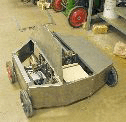 About:
About:
Meet the most destructive addition to my entire Arsenal. This sargent of abliteration weighs more than 10 bags of potatos
and is capable of sitting 3 people on its top. Because of its shear proportions, it was named Nuclear Holocaust, a huge blast
of awesome power and destruction.
Holocaust was built almost entirely in my high school metal shop. It took a whole semester of nonstop construction. Parts came
from the junkyard, Lowe's, RadioShack, and the metal shop itself (which was the best source for materials when looking at the costs).
This bot, unlike most of the others I built, has 4 wheels. Each one is driven by its own motor. Each side of the bot is controlled
independantly with 2 motors on the same channel thus giving it that tanklike steering again. Though the same home-made speed
controller was used which restricts its ability to have variable speed, a new feature was wired in practically solving that
hinderence. There is a High and Low opperating speed. High having a quicker ground speed, and low with reduced speed but with
higher torque. This feature was made possile by the different wire winding taps on the windshield wipper motors used in the
drive train.
 Construction Process:
Construction Process:
From these pictures you can see Nuclear Holocaust in its infancy. The entire framework was arc welded while the outer plating was attached with
industrial strength pop rivots.
Because of the electrical faulting problem mentioned elsewhere in the site, no metal portion of the motors is allowd to physically touch the
framework. It's clearly visible, in picture 1, how this problem was delt with. Oak insulation plates were made for contact prevention.
I would have to say one of the most difficult tasks in the construction of this bot was the seeminly-simple task of insulating the axels; keeping
them seperated from the frame. Because of the design chosen to build this bot, I could not locate any kind of bushing that would accomodate this
adaquitely. Eventually I came across high density nylon hose, this seems to be working for now. The problem with most materials is that they wear
through relatively quickly due to the shear weight this monster puts on them.
The wheels are attached to aluminum axles by means of a filed level surface on the ends of the axles and a cotter pin. The rear wheels are from a
lawn and garden push hopper and the front wheels, much heavyer duty, are from an old lawn mower.
A method of easy entrance had to be present upon completion for upgrades, repairs, and maintanance so this was taken into consideration during
the armorment planning stage. Entrance from the top seemed to be the most logical so a "lid" method was incorporated by placing hinges along
either side of the center support. The dorsal plates can be lifted up much like a car's hood for quick access. In the event that more open space
is required, both dorsal plates can be removed entirely simly by removing the locking nuts holding on the center support bars. This can be seen
in picture 4.
The color scheme for this bot was based more on availability than anything. It can be seen in picture 5. Sure my metal shop had lots of colors to
choose from, but it was the quantity of those colors that would play the discriminating role. I needed a color that resembled something that
would come from a radioactive mishap, say something like the stereotypical nuclear waist. So from what i could choose from, green became the
lucky candidate. The orange also found on this bot was totally random.
 Blueprints, Order Forms, Sketches
Blueprints, Order Forms, Sketches


 Skeleton:
Skeleton:

 Hull Plating:
Hull Plating:

 Electrical Wiring:
Electrical Wiring:

 Related Sections:
Related Sections:
 Documentation on the Speed Controller Used for Nuclear Holocaust
Documentation on the Speed Controller Used for Nuclear Holocaust


 About:
About:
 Construction Process:
Construction Process:
 Blueprints, Order Forms, Sketches
Blueprints, Order Forms, Sketches








 Skeleton:
Skeleton:



 Hull Plating:
Hull Plating:



 Electrical Wiring:
Electrical Wiring:



 Related Sections:
Related Sections:
 Documentation on the Speed Controller Used for Nuclear Holocaust
Documentation on the Speed Controller Used for Nuclear Holocaust Viewer Comments
Viewer Comments Leave A Comment
Leave A Comment